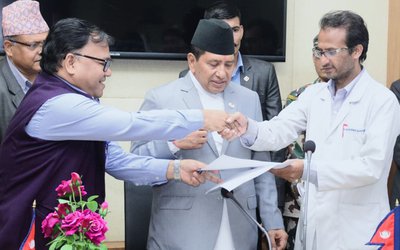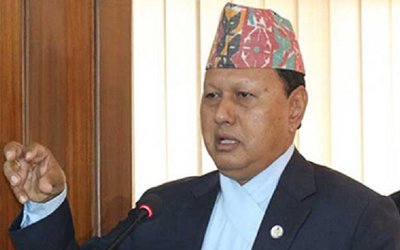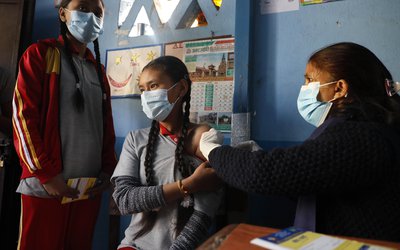Because of our poor health infrastructure, there is no question that an Ebola outbreak will be very difficult to handle in South Asia. There are examples of people returning to Nepal and India with other infectious disease from Africa. A good example is malaria. In Africa (unlike in India or Nepal) the common type of malaria is the life-threatening falciparum malaria. Unfortunately the symptoms of this kind of malaria can be just like a simple flu- like illness. So, a returning business man or a soldier from his peace keeping duties in Africa who returns home to his village may be incubating the dangerous form of malaria. He complains of a cough and cold, is given flu medicines and sadly soon succumbs to the malaria bug. This kind of scenario continues to play out.
The good news is that Ebola is nowhere as common as malaria and second, the governments in South Asia have been alerted to the possibility of people traveling from West Africa who may be incubating Ebola and have tried to take steps to prevent this outbreak. Whether in the first place the virus will successfully propagate to this part of the world or not, and how effective these governmental steps will be, only time will tell. But in general the consensus amongst experts is that there is only a slim chance for the Ebola virus to come here.
Probably the most well prepared region to deal with an Ebola outbreak in Asia is Hong Kong. This is because of their experience with the SARS (Severe acute respiratory syndrome) virus outbreak on 2003 where they learnt many important lessons. However the big difference between SARS and Ebola is that Ebola is not spread through aerosol so all the respiratory precautions used for SARS is not relevant for Ebola. For example in Hong Kong, after the SARS outbreak many intensive care units( ICU) were instituted with negative pressure rooms to keep the organisms away from circulating in the atmosphere. Luckily the Ebola virus does not circulate in the atmosphere. But in Hong Kong to better deal with SARS outbreak, they also instituted anterooms in these ICUs for the safe doning and removal of personal protection equipment, a matter of vital importance in dealing with an Ebola outbreak.
In general there is no question that China is better prepared to deal with an Ebola outbreak than other countries in South Asia because outbreaks like SARS and other influenza pandemics affected China and bypassed India. In addition, it helps that China’s health care spending per person is more than five times that of India. Similarly compared to China, total hospital beds available in India aresignificantlyfewer.
There is another important factor that will come into play if we have to deal with an Ebola outbreak. That is our mindset. We are not a country that likes to follow directions even when danger lurks. Take the tragic, daily motor vehicle accidents brought about by overcrowding in our public transportation system. We realize vaguely there may be rules which we may be bypassing by overcrowding our vehicles and traveling to the next town. But we still continue to carry out this behavior with abandon, and in the process continue to suffer for this. With this kind of a psychological impasse, it will be hard to deal with a disease where following directions (for example in disposing of dead bodies) is key to the prevention of the disease. In this context it is sobering to read that even in the mid-sixteen century London during King Henry the eighth’s reign when plague struck, common people followed directions and burnt all the beds and mattresses of patients who died of the disease.
Finally Ebola has to be seen in proper perspective in our context. Common, deadly, preventable ( and treatable) diseases like tuberculosis continue to rage on here. We clearly need to revitalize our efforts to control and treat diseases like tuberculosis.

Buddha Basnyat MD
Buddha Basnyat, MD, MSc, FACP, FRCP, Director of the Oxford University Clinical Research Unit-Patan Academy of Health Sciences, Kathmandu.
- Altitude Sickness
- Feb 20, 2018
- Post-earthquake Nepal: The Way Forward
- Dec 13, 2015
- The Annapurna Sanctuary
- Nov 29, 2015
- Diarrhea at the Summit
- Nov 08, 2015
- Altitude Sickness ( AMS, HAPE, HACE)
- Oct 15, 2015
















